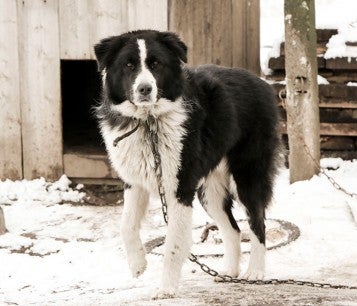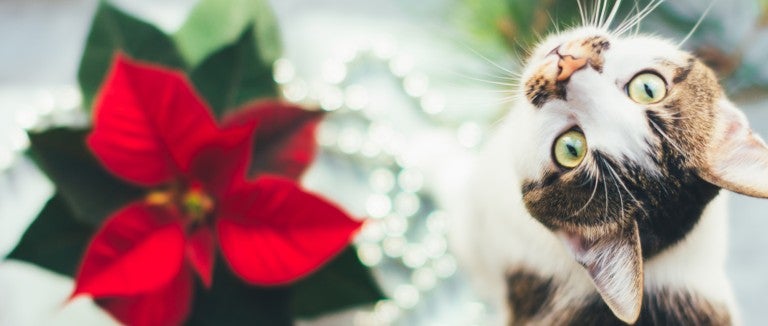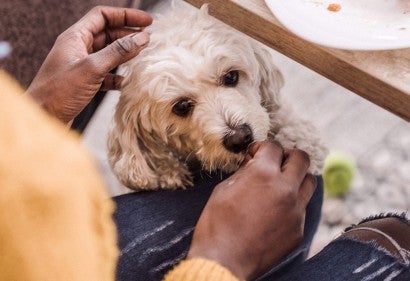Pet behavior and holiday guests
-
Though the excitement of a party may overwhelm some pets, keep your pets inside during cold weather and provide plenty of toys to keep them busy.
-
If needed, provide your cat or dog with a quiet room or crate during holiday parties and/or prepare ahead of time to discourage barking.
-
Inform your visitors ahead of time that you have a pet.
Skip the table scrap snacks: Foods not to feed pets
Commit to supporting dogs who live outdoors during cold weather by advocating to ensure that every dog has access to a shelter that keeps them warm enough and provides protection from the elements.

Deck the halls: Holiday decorations and pets
-
Christmas trees and holiday greens: Make sure your dogs or cats do not chew on limbs or droppings from the tree. Ingested pine needles could get lodged in the intestinal tract, puncturing the lining or bunching together and causing an intestinal obstruction.
-
Water base: The water base of a Christmas tree may contain dangerous chemicals that could harm your pet.
-
Christmas lights and tinsel: Position your tree's lights and tinsel away from the bottom of the tree where pets can reach them. Some pets climb up or into trees and can even knock them over.
-
Candles: Don’t leave candles unattended. Pets may accidentally knock them over and spill wax or start a fire.
-
Firestarter logs: Dogs that enjoy chewing should steer clear; these logs contain sawdust and paraffin which can cause an irritated stomach or even intestinal blockage when ingested.
-
Plants: A number of seasonal plants are poisonous to pets if nibbled or eaten, including ivy, holly, mistletoe and poinsettias.
By sleigh or sea: Holiday travel and pets
-
Carefully consider whether to take your pet with you on a trip (air travel can be dangerous).
-
If you leave your pets home while you travel, be sure to choose a pet sitter or boarding kennel wisely.
-
Wherever your pets spend the holidays, dogs and cats should all wear collars and tags with ID that offer a way to reach you.
Learn How to Travel Safely with Your Pets
In case of emergency
- Identify your closest 24/7 emergency veterinary clinic before an emergency occurs.
- Write down or store in your phone the number for your veterinarian or pet hospital
- Research and write down your pet hospital or clinic's holiday hours.
- Write down or store in your phone the number of the ASPCA Animal Poison Control Center: 888-426-4435. Note that a consultation fee may apply.


